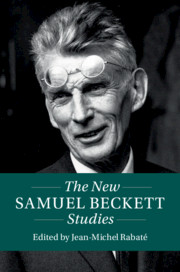Book contents
- The New Samuel Beckett Studies
- Twenty-First-Century Critical Revisions
- The New Samuel Beckett Studies
- Copyright page
- Contents
- Figures
- Contributors
- Editor’s Introduction
- I The Expanded Canon
- Chapter 1 Digitizing Beckett
- Chapter 2 “All the Variants”
- Chapter 3 Beckett’s Letters
- Chapter 4 The Evolution of Beckett’s Poetry
- II New Contexts and Intertexts
- III New Hermeneutic Codes
- Index
Chapter 2 - “All the Variants”
from I - The Expanded Canon
Published online by Cambridge University Press: 17 June 2019
- The New Samuel Beckett Studies
- Twenty-First-Century Critical Revisions
- The New Samuel Beckett Studies
- Copyright page
- Contents
- Figures
- Contributors
- Editor’s Introduction
- I The Expanded Canon
- Chapter 1 Digitizing Beckett
- Chapter 2 “All the Variants”
- Chapter 3 Beckett’s Letters
- Chapter 4 The Evolution of Beckett’s Poetry
- II New Contexts and Intertexts
- III New Hermeneutic Codes
- Index
Summary
In the first typescript of the play Footfalls, Samuel Beckett tells the story of Haddon the general practitioner, who will be “dead soon after.” Unhappy with this formulation, Beckett corrected this to “soon to die.” Subsequently, he noted three further expressions of Haddon’s impending demise: “with not long to live” crossed out, then “long past his best,” before finally reverting to “not long to live.”Furthermore, Beckett noted an addition in the left margin of the typescript, “Made rather a mess of it,” a remark that could refer to both Haddon’s exercise in dying and Beckett’s attempts at inscribing it. This struggle between textual and fictional ending can be found in many manuscripts’ drafts. Especially in his late prose, that is to say from the mid-1960s up until his death in 1989, Beckett negotiates the thresholds, the vulnerability of artistic creation, which is constantly threatened by erasure.
- Type
- Chapter
- Information
- The New Samuel Beckett Studies , pp. 36 - 47Publisher: Cambridge University PressPrint publication year: 2019
- 3
- Cited by

